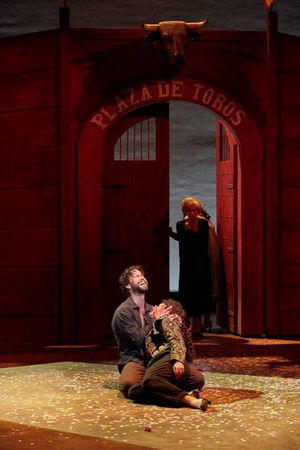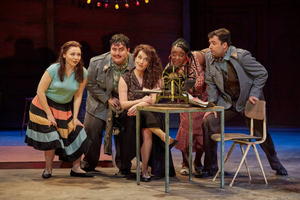Review: CARMEN at Opera Theatre Of Saint Louis
Opera Theatre of Saint Louis opens its 47th season.


Opera Theatre St. Louis opens it's 47th season with a striking production of Bizet's Carmen. Rejoicing fills the building as the company returns to their beautiful stage in the Loretto-Hilton Center for the first time in three years.
Bizet's Carmen premiered in Paris in 1875--to generally bad reviews. It shocked both reviewers and audiences. Structurally it was an opéra-comique; for goodness sake, the very theater in which it opened was named the Opéra Comique! And yet, there's that very bloody death at the end! Is this verismo? It sure ain't comique!
Georges Bizet died just three months after that premiere (at the age of 36). He was given a grand funeral. A memorial performance of Carmen was presented that night, and the press--who had universally panned the show at its opening--now declared Bizet a "master". Yet it took several more years and many performances (of various versions) before Carmen was established, world-wide, as the true masterpiece that it is. In recent years it has been the fourth most-frequently-produced opera in the world. Opera Theatre of St. Louis has produced it now four times--roughly once a decade.
We enter the theater and we see the stage backed by dark, ominous high board walls with a central gate. Above and behind is a vast rose-gold sky. It is oddly blemished. On the floor down-left is--something-a pile of . . . in the dark we-don't-know what it is.
Daniela Candillari lifts her baton; she whisks the familiar overture into instant excitement. And away we go!!
Lights up! As the overture proceeds Carmen enters and walks down-left to pick up . . . it's a severed bull's head. Casually she drags it off as it drips blood across the stage. She walks in almost a tango step, with a little retardation of the trailing foot. It's an inspired directorial touch.
The overture concludes.
Maestra Candillari is only newly the Principal Conductor at OTSL, but this young lady is definitely a "keeper"! Her orchestra is simply flawless. Dynamics beautifully support the emotions of the drama, yet the orchestra never dominates the voices. There is a gorgeous smoothness throughout.
All the principal roles are (as usual at OTSL) sung by truly world-class voices. Sarah Mesko plays Carmen and blesses the role with her lovely powerful voice, wonderful diction, and a strong, large-featured beauty.
Her two competing lovers, Don José and Escamillo, are sung by Adam Smith and Christian Pursell. Never have I heard two such splendid male voices so perfectly set against each other in romantic competition. Both men (tenor Smith and bass-baritone Pursell) are tall and strikingly handsome. Pursell's voice, in the famous Toreador Song rings quite heroic, and Smith, especially in his plea to Carmen at the end of the tavern scene, sings with such wonderful feeling and power. The two combative duets--José vs. Escamillo and José vs. Carmen--are ` stunning. Both are powerfully mano a mano.
Yunuet Laguna sings Micaëla, the simple country girl who comes with messages from José's beloved mother. In her aria, alone and frightened in the deserted smugglers' camp, imploring God to give her courage, she triumphs and gives a pure serenity to those high notes.
Supporting roles are uniformly strong. These include Jesús Vicente Murillo, Schyler Vargas, Titus Muzi, Cesar Andres Parreño and Jared Esguerra as officers, smugglers and an innkeeper. Jazmine Olwalia brightens things as Carmen's friend Mercedes, and Shelén Hughes is particularly spirited and frisky as Frasquita. Rachael Nelson gives a fiery flamenco dance.
Kudos to Chorus Master Kevin miller for his work throughout! The almost-patter song in which the smugglers seek the girls' help flows so beautifully, the patter swirling like bees. And the powerful chorus that closes that act is most impressive.
Stage Director Rodula Gaitanou chooses to set the story not at the start of the nineteenth century, as Bizet indicates, but in the 1950's under the Franco regime. This didn't bother me as much as I expected it to. I was, perhaps, the only one to laugh when Carmen entered Act One on a motorcycle. This is simply a gimmick attempting to establish her as one of "The Wild Ones".
Cordelia Chisholm, scenic and costume designer, gives us a dark, oppressive--even brutal world, quite appropriate to Franco. Costumes are in a fittingly grim palette. But I do have a quarrel or three with Ms. Chisholm:
- Carmen wears mostly black, when she should be a splash of red against this dull background. Does Carmen have to be red? (Red rose, red blood, red Carmen?) Must Richard III be dressed in sooty black? Well, maybe yes to both.
- Escamillo sings the glorious "Toreador Song" in most unflattering dark garb. Surely, here, he needs that glittering traje de luces.
- In the smugglers' camp the flirtatious Frasquita wears a rather flashy men's suit that simply shouts "lesbian"--hardly suitable for the girls' assigned task: to distract the guards through seduction.
But my chief problem with this production is the director's choice to make it about Carmen's struggle for women's liberation. Carmen is the title role, but not the central character. Don José is the tragic figure who yields to temptation and falls from innocence. Carmen loves sex and the power it gives her, she loves men (or loves using them), and she relishes the game at which she is so gifted. She is the feminine equivalent of Don Giovanni, racking up one erotic conquest after another. And she is no more daunted by that recurring Tarot Death-card than is Giovanni by the threat of fiery damnation. Giovanni is simply Ego (or Id); Carmen is a force of Nature.
I have seen Medea reduced from a demi-god to an angry divorcée. Let's not reduce Carmen from a magnificent Temptress to a militant feminist. I am the least religious of men, but I am loathe to yield the stage to a world where there is no longer any sin--there is only social injustice.
But Carmen is about music! Bizet's luscious, very modern-sounding score is given a splendid production at Opera Theatre Saint Louis.
Photo Credit: Eric Woolsey
Reader Reviews

Videos
